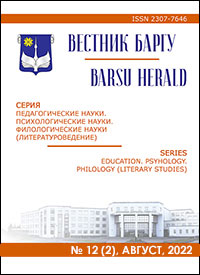THE CONSTRUCTION OF TERRITORIAL IDENTITY IN CONTEMPORARY FICTION
Keywords:
literary space; literary time; chronotop; narration; toponym; author’s intentionAbstract
The article focuses on the study of the spatial and temporal format of literary works. Special attention is paid to the actualization of toponyms that reflect national and cultural specificity, territory identity and form the logical and semantic content of texts. When analyzing contemporary fiction, it is advisable to single out and interpret not only specific geographical objects and spatial images that convey the author’s identity but also concentrate on cultural and historical associations communicated by them, and also take into account the socio- and ethno-cultural nature of the spatial models presented in the text. An important role in the organization of the artistic space of any work belongs totoponyms, which turn into special transmitters of territorial information. Moreover, they not only determine national
and cultural specificity of the text, but also correlate with its plot and basic ideas.
Ref.: 21 titles.
Downloads
Published
Issue
Section
License
Copyright (c) 2023 Вестник БарГУ Серия "Педагогические науки. Психологические науки. Филологические науки"
Это произведение доступно по лицензии Creative Commons «Attribution-NonCommercial» («Атрибуция — Некоммерческое использование») 4.0 Всемирная.
Авторы сохраняют за собой право заключать определенные договорные соглашения, касающиеся неисключительного распространения опубликованной версии работы (например, размещать ее в институциональном репозитории, публикация в книге) со ссылкой на ее первоначальную публикацию в этом журнале.





